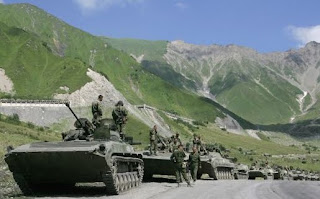 The EU released its report on the August war between Georgia and Russia on Wednesday, and for the last two days the press has reported that it proves “Georgia started the war with Russia.” Even Joshua Keating, who offers a more even-handed round-up at Foreign Policy, says the claim that AP’s claim that “Georgia Started the War with Russia” is “basically correct.”
The EU released its report on the August war between Georgia and Russia on Wednesday, and for the last two days the press has reported that it proves “Georgia started the war with Russia.” Even Joshua Keating, who offers a more even-handed round-up at Foreign Policy, says the claim that AP’s claim that “Georgia Started the War with Russia” is “basically correct.”
I’ve only finished the first volume of the report so far, but this is not how I read it at all. Actually, it says exactly the opposite on pg. 31 and 32:
“Any explanation of the origins of the conflict cannot focus solely on the artillery attack on Tskinvali in the night of 7/8 August… overall, the conflict is rooted in a profusion of causes comprising different layers in time and actions combined.”
The “Georgia started it!” frame appears to be grounded in two findings. The report acknowledges Georgia’s armed attack on Tskhinvali was in violation of international law, and also argued that this attack constituted “the first shot” in what became a larger conflict.
But I don’t see how that’s an argument that Georgia “started” the war with Russia. Georgia committed an illegal attack on an population center within its own territory – escalating what was already a low-intensity war within Georgian borders. Russia internationalized this “war” by sending troops across the border in violation of the territorial integrity norm. And given that the report also casts doubt on Russia’s claim to have done so to protect civilians, it’s hard to see how one illegal act within one’s territory can be construed as blame for an international war. At any rate, the report itself nowhere claims as much.
What’s most interesting about Volume I of the report, though, and what may explain the way its findings have been misinterpreted, is that it appears to conflate the civil and interstate wars of which the “August war” was composed. This is particularly ironic given that the report’s authors “notice with regret an erosion of the respect of established principles of international law such as territorial integrity” (p. 31) but then, ironically, blur those very principles in failing to distinguish the civil and interstate elements of the conflict. It is not until p. 36 that the 45-page report summary even acknowledges that there were these two different components to the war; the fact that the authors do not disaggregate these aspects in assigning blame muddles the legal analysis completely.
No wonder both sides can claim the report is a victory for them.
Charli Carpenter is a Professor in the Department of Political Science at the University of Massachusetts-Amherst. She is the author of 'Innocent Women and Children': Gender, Norms and the Protection of Civilians (Ashgate, 2006), Forgetting Children Born of War: Setting the Human Rights
Agenda in Bosnia and Beyond (Columbia, 2010), and ‘Lost’ Causes: Agenda-Setting in Global Issue Networks and the Shaping of Human Security (Cornell, 2014). Her main research interests include national security ethics, the protection of civilians, the laws of war, global agenda-setting, gender and political violence, humanitarian affairs, the role of information technology in human security, and the gap between intentions and outcomes among advocates of human security.

0 Comments